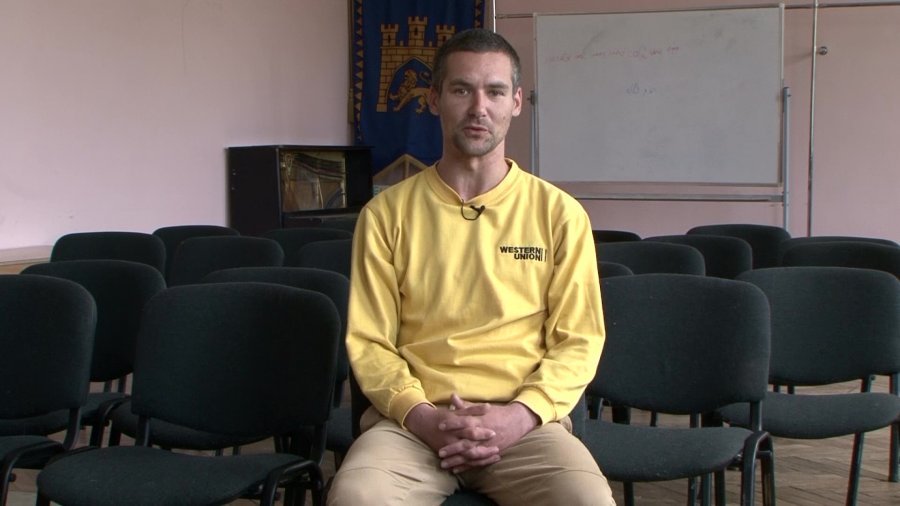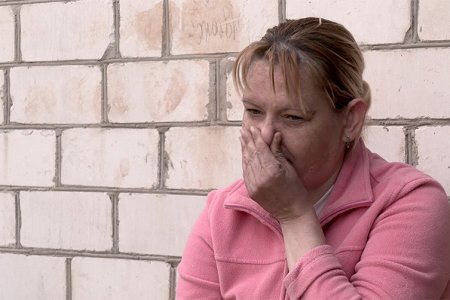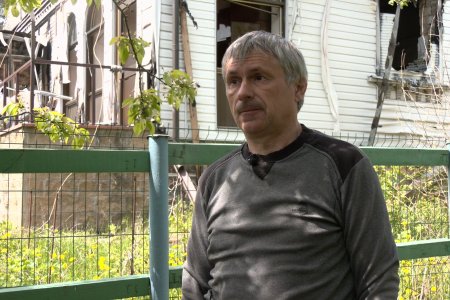My name is Nozhaiskyi Denys Borysovych. I was born in Novovolynsk, Volyn region. I am 34 years old. I have basically lived there all my life.
My second hometown was Mariupol. Because my aunt and her son lived there the whole life. After the Chernobyl disaster (in 1986) they were sent there. The government gave my aunt an appartment because she was a single mother. And she lived there all her life. I used to spend there almost every summer. And it is very painful for me to hear what is happening in Mariupol now...
I graduated from vocational school as a gas welder, but I did not work by profession. My father taught me how to putty walls, prime surfaces, paint cars, etc. My father died early. My mother died a few years after him. Almost two years ago I decided to go to Kyiv and find a job there.
I started with a cleaning company. Me and my friends chipped in and started our own business. We cleaned buildings after repairs. We gave our employees a chance to earn money, and we earned money ourselves. I lived in Kyiv for almost a year and eight months. I slept in hostels, and sometimes I even lived at work, right at a construction site.
Do you remember the first days of the full-scale aggression?
The war ruined everything. It was a huge shock for me. It turned out that I didn’t have any media at hand, I was completely at work. So I woke up once and was surprised: there were long queues in shops and ATMs. I didn’t understand what was going on...
I didn’t hear those explosions at the airports. But when I started talking to people, I just realised that a serious war had started, that putin had gone mad. So the whole life of ordinary people, their work, etc. — everything just collapsed.
I stayed in Kyiv for two more weeks. During those weeks I didn’t know who to call and what to do. I lost contact with my aunt in Mariupol. I was very worried about her, I even wanted to drive to Mariupol and find her there. Because her son has been defending the country for more than three years as a military. And it turned out that he was sent straight to the front line. We all were worried about my aunt. We realised that Mariupol was under massive shelling, but we lost contact with her...
Thank God, we found my aunt later in Zhytomyr. But she got a very serious psychological trauma. She had been working as a kindergarten teacher all her life. And for more than twenty years she waited for an appartment (from the governement) and finally got the one. But now she told us that everything was destroyed: her appartment, the dormitory where she had been living before she got her appartment — everything was gone. My aunt was always so cheerful, but now she is always in tears and her psyche is damaged. People went through terrible things there...
Did you see other shelling and destruction of civilian buildings and houses?
It happened on second or third day of the war. I lived on Revutsky Street,18. It was very close to the district police department on Koshytsia Street. And when a cruise missile flew there, our air defence system shot it down. And either the missile changed its direction or there were just pieces of it — but it hit a residential building. Several floors of that building were comletely destroyed. I saw it with my own eyes. People were putting out the fire, cleaning up the destruction. And I saw that shell crater...
I heard that there was fighting at the thermal power station, when I was still in Kyiv. There was fighting as well for the power station. I heard that at night too.
Have you witnessed situations in which you saw criminal acts against civilians?
I didn’t know what to do. And then my work colleague Sashko appeared and asked me for help because I had driving licence. One man gave us his minibus and asked me and Sasha to take his wife and child from Bucha at least to Kyiv. And then to drive them abroad. That was the plan, but unfortunately it didn’t work out. We drove to Bucha, it was before those atrocities — when people were raped and killed. But there was already shelling.
And when we arrived (to Bucha), we came under the first shelling, when they (Russian troops) were “aiming” already at civilian houses all over the town.
We had to hide in a cellar in the very appartment block where he (the man who gave them the minibus) had rented an appartment. There were five other women and nine children in the cellar. We stayed there for almost three days, we didn’t come out at all. The shelling was serious, and there was the information that Russian troops were already in the town. We were not as worried about ourselves as we were about the women and children.
After two days, I went outside and saw the pure horror: the houses nearby were already destroyed. And our car had been hit too: the car was just burned down. It exploded and burned to the ground.
I went back to the cellar and told Sashko everything. We tried to talk quietly so that the women wouldn’t hear us, so that there would be less panic and less children crying. We decided we would spend the night there and next day we would leave no matter how. We would take any transport we could get in...
And it turned out that that night a rocket hit the appartment block where we were hiding. A guy named Vova was with us. He was from Bucha, we met him there. When a rocket hit our shelter, a hot water pipe there was damaged. The boilling water doused him. I got some of the shrapnel in my leg, I had a surgery later. He (Vova) was doused with boiling water, it was horrible. We had to leave the cellar because we thought it was going to collapse on our heads. And by morning, we took all the children to a regional train and came to Darnitsky railway station (Kyiv). And there we waited for departure to Lviv.
Vova was in critical condition, all his clothes just stuck to him. He got terrible burns. Thank God, we were hospitalised by “Samaritan’s Aid”...
They (Russian troops) were just shooting all over the city. There was nothing there that threatened them, no military base — nothing was there. They just wanted to bomb us. They had this delusion that in every building there were Ukrainian military men hiding behind civilians. That was all their reasoning...
“Grads” (Russian multiple rocket launcher) were firing, there were craters from shells everywhere. One shop owner knew that Russian soldiers were already approaching. He just opened his shop. And he started giving everything to local people for free. He said: “Take everything because the Russians will come and loot”. We didn’t have any hot food to eat, just some biscuits. We also had to use a bucket as a toilet.
There were mostly girls with us in that cellar. Little girls — from four to twelve years old. But thank God, they have been taken to Europe later, and my colleague’s wife and child are already in Holland.
What are your plans for future?
I am currently rehabilitating my leg. I also have a military profession. I am a T-64 tank operator. I served in 2008-2009. I’ve been registered in Lviv. I need to heal my leg. And then I’ll go to defend my country. My wish is to take revenge for what they (Russians) have done in our country. That’s all. I want to fight back. So that they would never come back here again and would never even think of coming back.

Translation: International Society for Human Rights (German Section)
 The article was prepared by the Kharkiv Human Rights Protection Group with the support of the "
The article was prepared by the Kharkiv Human Rights Protection Group with the support of the "


